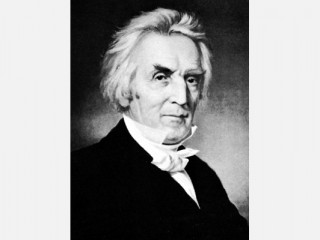
Alexander Campbell biography
Date of birth : 1788-09-12
Date of death : 1866-03-04
Birthplace : County Antrim, Ireland
Nationality : Irish-American
Category : Famous Figures
Last modified : 2010-11-17
Credited as : Clergyman, son of Presbyterian minister,
Alexander Campbell was an Irish-born American clergyman who, with his father, founded the Disciples of Christ, an indigenous American church movement.
Alexander Campbell, the first child of Thomas Campbell, a Presbyterian minister, was born Sept. 12, 1788, in County Antrim, Ireland. Educated in Ireland and at Glasgow University, Alexander brought his family to America in 1809, where they reunited with the elder Campbell, who had settled in western Pennsylvania. He joined in his father's rejection of Presbyterianism and in 1811 helped to organize a Christian Association Church at Brush Run.
In 1812 Campbell was ordained and within a few months assumed leadership of the religious movement that his father had started. The birth of his first child that year led him to question infant baptism, and intensive study convinced him that baptism by immersion was the only correct form. His father concurred, and after both were immersed they led the Brush Run congregation into affiliation with the Redstone Baptist Association in 1813.
Preaching for the sole authority of Scripture and against creeds and other additions of the institutional church, Campbell attracted both support and attack. His defense of immersion against Presbyterians in public debate in 1820 and 1823 popularized his views. His influence broadened after 1823, when he began to publish the Christian Baptist. Baptists began to dislike his anticreedal emphasis so Campbell changed his church's affiliation to a more favorable group, the Mahoning Association in Ohio. However, after 1827 all Baptist groups began to exclude the Campbellites.
By 1830 the Disciples of Christ (as they were now called) emerged as a distinct movement; all relations with Baptists were officially terminated. That year Campbell replaced his earlier paper with the Millennial Harbinger, which he edited until his death. Campbell's adherents were attracted by a similarity of purpose to the Christians in Kentucky associated with Barton W. Stone by 1832, and within a few years the two movements had largely merged.
Campbell was the key leader of the movement for a generation after this union. Having to guide the enlarged society led him to modify earlier ideas against church organization, and after 1849 he agreed to serve as president of the new American Christian Missionary Society. In 1840 he founded Bethany College and was its president for 20 years. Tirelessly, he published a translation of the New Testament and numerous theological works. His debates with Bishop Purcell on Roman Catholicism (1837) and the Rev. N. L. Rice on baptism (1843) gained him a national audience, and in 1850 he addressed both houses of Congress. The Civil War and failing health slowed his efforts, and he died March 4, 1866.
All accounts of Campbell rely on the basic biography by his friend Robert Richardson, Memoirs of Alexander Campbell (2 vols., 1868-1870). Winfred Ernest Garrison and Alfred T. DeGroot, The Disciples of Christ (1948; rev. ed. 1964), is the best history of the movement.
















